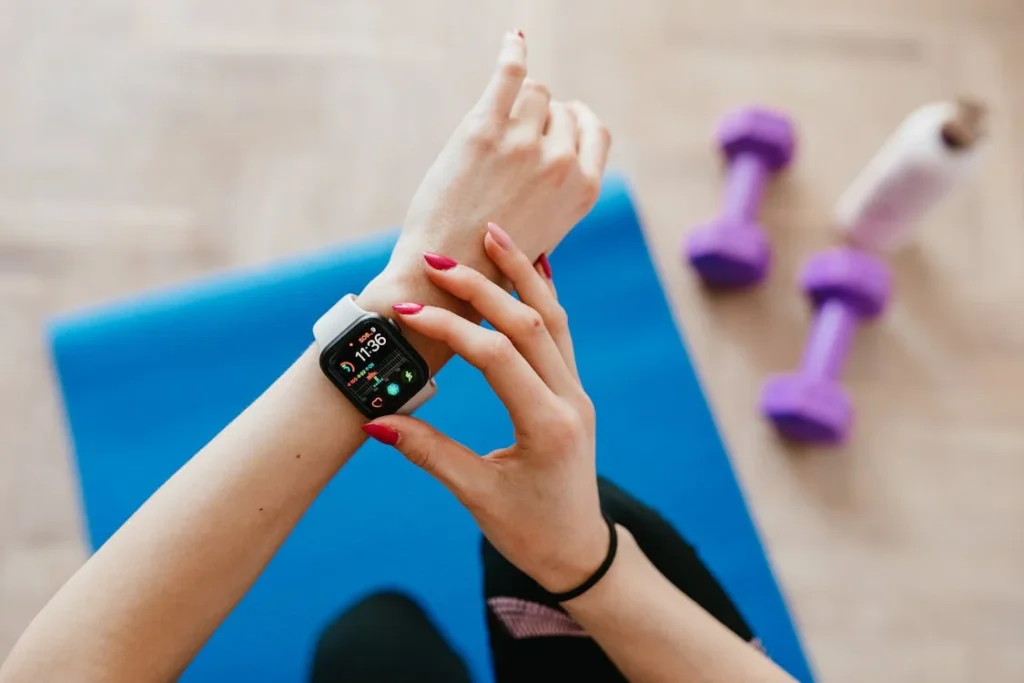Smartwatches have transformed into essential gadgets, featuring health monitoring, fitness tracking, and now temperature sensing. In 2025, several models offer comprehensive temperature sensors and come with a range of additional features. Here’s a rundown of the best options on the market this year.
1. Apple Watch Series 9
- Temperature Sensor: Yes
- Key Features: Blood oxygen monitoring, ECG, activity tracking, water resistance, fall detection, advanced fitness tracking.
- Battery Life: Up to 18 hours
- Compatibility: iOS
- Price: Around $399
The Apple Watch Series 9 includes an advanced temperature sensor, integrated with health tracking features to offer comprehensive insights. The temperature sensor in this model is used mainly to improve the accuracy of cycle and sleep tracking, but it has potential benefits in monitoring overall wellness trends.
Pros:
- Comprehensive health monitoring
- High-quality display
- Integration with Apple ecosystem
Cons:
- Limited battery life
- Expensive
2. Samsung Galaxy Watch 6
- Temperature Sensor: Yes
- Key Features: Sleep and stress tracking, blood oxygen, ECG, built-in GPS, water resistance.
- Battery Life: Up to 40 hours
- Compatibility: Android, limited functionality with iOS
- Price: Around $329
Samsung’s Galaxy Watch 6 also boasts a temperature sensor with features that help monitor sleep cycles, offering detailed health insights. This model is equipped with Samsung Health Monitor, making it versatile for fitness enthusiasts and casual users alike.
Pros:
- Excellent battery life
- Durable design
- User-friendly interface
Cons:
- Limited features for iOS users
- Bulkier than other models
3. Garmin Venu 3
- Temperature Sensor: Yes
- Key Features: GPS, Pulse Ox, body battery, stress tracking, water resistance.
- Battery Life: Up to 12 days
- Compatibility: iOS, Android
- Price: Around $449
Garmin Venu 3 is ideal for outdoor enthusiasts and athletes, providing rugged durability with a comprehensive suite of tracking features. The temperature sensor allows continuous tracking, helping users monitor both body temperature and hydration levels for more effective training.
Pros:
- Long battery life
- Advanced fitness tracking
- Great for outdoor use
Cons:
- Pricey
- Interface can be complex for beginners
Comparison Table of Smartwatches with Temperature Sensors
| Feature | Apple Watch Series 9 | Samsung Galaxy Watch 6 | Garmin Venu 3 |
|---|---|---|---|
| Temperature Sensor | ✅ | ✅ | ✅ |
| Battery Life | Up to 18 hours | Up to 40 hours | Up to 12 days |
| Compatibility | iOS only | Android (limited iOS) | iOS, Android |
| Water Resistance | 50 meters | 50 meters | 100 meters |
| Price | $399 | $329 | $449 |
| Primary Use | Health tracking | Fitness, sleep tracking | Outdoor, fitness |
Why Temperature Sensors Matter in Smartwatches
Temperature monitoring in wearables goes beyond wellness insights. While early temperature sensors were basic, today’s devices offer continuous, real-time data that provide context for a range of other metrics, from sleep patterns to exercise intensity.
FAQs: Choosing a Temperature Sensor Smartwatch
- Which smartwatch has the longest battery life?
- The Garmin Venu 3 stands out with a battery life of up to 12 days, ideal for users who require extended functionality without frequent charging.
- Are temperature sensors accurate?
- Most smartwatches provide reliable, continuous temperature monitoring. However, they may not replace dedicated thermometers in clinical accuracy.
- Do temperature sensor smartwatches support third-party health apps?
- Compatibility depends on the platform. For example, Apple Watch supports a variety of health apps, while Samsung is more integrated with Samsung Health.
Conclusion
Smartwatches with temperature sensors in 2025 bring advanced functionality for health-conscious consumers. Whether you prefer Apple’s ecosystem, Samsung’s versatility, or Garmin’s rugged build, these smartwatches deliver robust health monitoring that caters to various lifestyles.


